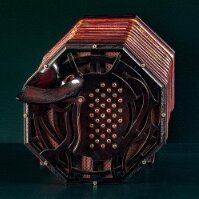
hjcjones
Members-
Posts
1,200 -
Joined
-
Last visited
About hjcjones
- Birthday 07/15/1954
Contact Methods
-
Website URL
https://www.howardjones.me.uk/
-
ICQ
0
Profile Information
-
Gender
Male
-
Interests
Traditional music and song, especially English.
I play Anglo: a C/G Crabb 40 key, a Dipper D/G 31 key, and Lachenal F/C baritone. Besides concertina, I play melodeon, guitar, hammered dulcimer and recorder, and sing.
I used to be in the ceilidh band "The Electropathics" and now play with Albireo -
Location
Cheshire, UK
Recent Profile Visitors
3,177 profile views
hjcjones's Achievements

Heavyweight Boxer (5/6)
-
Dating A Lachenal From The Serial Number
hjcjones replied to johnconstable's topic in Concertina History
-
EFDSS looking a bit foolish.
hjcjones replied to Robin Madge's topic in General Concertina Discussion
I've always wished the EFDSS well, but in 55 years of active involvement in folk music, as a solo performer in folk clubs, morris dancer, ceilidh band musician and event organiser, I've never found it to have the slightest relevance to me. When I first got involved in folk it was very much focussed on social dance for mostly middle-aged people, with little interest in song or the other things which were attracting young people to folk. There was a time when it seemed to be moving in a broader direction, but recently it has turned itself into a "folk arts" organisation and seems to be interested mainly in professional artist development, youth education and working with other communities to create new work. Nothing wrong with any of that of course, but it shows little interest in preserving or maintaining what is left of our folk tradition or providing support to the grass roots. Under Derek Schofield's editorship EFS magazine was a good read, but since he left it has gone downhill. Some of this may be due to having its funding slashed, but it was heading in that direction before. It seems embarrassed even to use the word "English" given its recent proposal to change its name (which seems to have gone quiet but hasn't been ruled out). I'm obviously not the only one who thinks this, since only a tine fraction of those involved in folk are individual members - the most recent accounts show only 2043 individual members, and 560 affiliated groups (many of which will have joined for the insurance cover). The Library and Journal are obviously important resources but it is as if they are a separate organisation. They seem to be entirely separate from the EFDSS's day to day activities. -
It's perhaps worth pointing out that, contrary to popular opinion, this is not an Irish drinking song. Although the rousing chorus in the version which is known to almost everyone may suggest a roistering good time, if you pay attention to the words it's actually a temperance song. Its origins probably go back to a seventeenth century broadside, and it is found in many versions throughout the English-speaking world. However it was collected only a few times in Ireland. It's association with Ireland probably comes from the versions by the Dubliners and Clancy Brothers.
-
Camping with a Concertina?
hjcjones replied to jamesmason06's topic in General Concertina Discussion
I've taken my instruments camping with me to festivals for many years, with no ill-effects. At night they stay locked in the car. During the day, I have them with me. However if this is a general holiday, rather than a musical one, I'd be more worried about security if I won't want to take the instrument everywhere with me Tents are obviously not secure and cars can get very hot (even more of a problem for instruments with waxed-in reeds). However there have been times when I've had to leave instruments in the car, and I wrap them in a blanket to provide some insulation. Sound carries a long way outdoors and tents have no sound insulation. Will your neighbours on the campsite want to be regaled by someone who is still a novice player? Or even an expert one, for that matter? I don't see any reason not to take a concertina camping if you take care, but I would consider carefully whether it's really a good idea. -
Barleycorn are currently offering an Aeola for £4000. Don't know enough to compare them, but compared with that this looks like a good deal even if it isn't as high a quality instrument. From your description, this is a good instrument. Good vintage instruments aren't easy to come by. Each one is individual, because it has its own history. If you come across one that calls out to you then offer what you think is a fair price. By all means negotiate, but don't miss out for the sake of a few bucks. If it's the intrument for you then in the long run you may regret missing out more than you'd regret paying a little more.
-
Miranda has a beautiful album out of her tunes based on bird song. It's called "Bird Tunes" and it's available from her website. It's rather lovely and well worth a listen. Miranda Rutter - Bird Tunes Rob is accompanying her, so it is on-topic for this forum
-
Before you go down the rabbit hole, try a few more workshops and sessions. You may find that with more experience you become better at picking out the sound of your own instrument. A less techy, but simpler and possibly cheaper, solution is to wear a wide-brimmed hat. Some find it helps to focus the sound.
-
I use In ear monitoring, but that's when playing in a band through a proper PA. Using one in a session presents different problems. Ideally you want a compact system that isn't too fiddly, does't get in the way of other players and if possible is battery powered rather than relying on the mains. There are systems to allow electric guitar players to listen through headphones, but these usually plug into the guitar itself and won't take external mics. You will need a pair of mics, one for each end, with some way of attaching them to the instrument. Many mics need phantom power from a mixing desk, so you will need ones which have batteries or don't require power. You'll then need some sort of amp to connect the mics to your earphones. It's important to understand that the signal from mics is at a different level from electric guitars ("line level") so gear designed for guitars may not work. If you're considering this, go to a good music store and explain exactly what you're trying to do. Something like this might work for you, but take expert advice. https://www.amazon.co.uk/JUST-MIXER-Audio-DJ-Mixer/dp/B01LPT8JY8 This doesn't provide phantom power so you'll need mics which don't require it.
-
You say this was your first workshop. Workshops are often difficult, especially if they are in a confined space as you describe. You have a lot of instruments all of the same type, all occupying the same sound frequencies and with similar tonal characteristics, and all playing (or trying to play) the same notes. That can make it very difficult to pick out your own instrument. This doesn't just apply to concertinas, but the high pitch and shrillness can be particularly difficult, and the way the instrument is normally held means the sound from your own instrument is projected away from you but you are on the receiving end of your neighbours' instruments. I have found that it becomes possible to recognise and focus on the tone of your own instrument, but it takes practice and concentration. Sometimes I deliberately play a wrong note just to help me tune in to my own sound. Obviously you can't do that too often. However if you are having similar problems in sessions with more of a mix of instruments then it is possible you have a hearing problem. The higher frequncies are usually the ones to go first, whether through age or damage, so this might affect how you hear the concertina. Have you thought about seeing an audiologist?
-
I don't understand the thumb straps and pinky rests of the EC
hjcjones replied to John Ray's topic in Ergonomics
Everyone's hands are different, so what works for one player may not work for you. It's no good copying another player, even one whose playing you admire, if their technique isn't suitable for you. I am an anglo player and a great admirer of John Kirkpatrick's playing. We both play near-identical 40 button Crabbs. He often uses his pinky to support the instrument, but I cannot do so comfortably, and if I try it greatly restricts my playing, so that is something I don't try to copy. -
I don't understand the thumb straps and pinky rests of the EC
hjcjones replied to John Ray's topic in Ergonomics
I am not sure what you mean by this, but taking your words at face value I wonder whether you are trying to get the full length of your finger under the rest. The shape certainly suggests this might be correct, but to do so would certainly force your hand into an uncomfortable position. A photo or video to illustrate what you are doing would help. I don't play EC myself, but I observe that most players seem to have just their fingertips on the rest. This Youtube of Rob Harbron has a number of close-ups of his playing, eg at around 34:40 which show very clearly how he holds it. -
Accordion as accompaniment to concertina
hjcjones replied to Gregor Markič's topic in General Concertina Discussion
Whoops! I really do know better. Now edited, thanks for pointing it out. -
Accordion as accompaniment to concertina
hjcjones replied to Gregor Markič's topic in General Concertina Discussion
That's not as straightforward as it sounds. It depends what keys you prefer to play in. The rows of a melodeon are a fourth apart, whereas anglos are a fifth apart, so they don't quite match up. Melodeons are commonly found in D/G, F/C and G/C, and less commonly in A/D and Bb/Eb. Other combinations are sometimes found (I'm not including the semi-tone apart boxes as these are a completely different style of playing). Club and steierische boxes have gleichtons, which play the same note in both directions which opens up some possibilities. Some, like the one in the clip, have an extra row which usually has accidentals and reversals, and also additional chord buttons. In that clip the tune is in G and she appears to be playing a D/G melodeon. That's also good for E min, A dorian and (less easily) B min. However that isn't so good for playing in C, as the two-row has only one F natural, and no F chord. A G/C covers both the anglo home keys, and is often used to play in A min, but isn't so good for playing in D. Think about what keys you play in most and then decide which melodeon configuration covers those the best. As well as the melody notes, you also need to thing about what chords are available. Note layouts for most of the common variants can be found on melodeon.net https://forum.melodeon.net/index.php/page,keyboard.html -
At least the Jeffries Duet has the same physical arrangement of the buttons as the anglo, which makes conversion possible. The other duet systems each have visibly different button layouts, which would rule out converting from one to another, and of course the EC bears no relation to any of them. That's without the difficulties of different sized reed slots and chambers. The OP hasn't said what his budget is. My impression is that duets are generally cheaper than the equivalent EC or anglo. Of course it may be easier to find cheap entry-level instruments in those systems. In my opinion it is always worth setting your budget higher than you can really afford, and find some way to pay for it. You'll seldom regret buying a better instrument, and if you find you don't get on with it you can probably sell it again without making a significant loss, and possibly even a profit.
-
The more tunes you learn, the easier it becomes to learn more tunes. Most tunes in the Irish tradition (and indeed the other traditions of the British Isles) follow a fairly standard pattern in which many of the phrases are repeated, although perhaps with minor variations. Once you get to understand this structure you realise that instead of having to learn every note of the tune you only have to learn a few phrases, and a few variations, and then string them together. The other aspect is that the same, or similar, motifs tend to pop up in different tunes, and when you get to them you realise you already know how to play them. As for the actual process of learning tunes, everyone is different. I learn by ear, so before I even start the tune will have attracted me, and perhaps become an earworm. For me, learning the tune is a separate process from learning how to play it - I need to be able to sing the tune to myself, and this comes from repeated listening. When the tune is in my head I can think about transferring to to my fingers.





